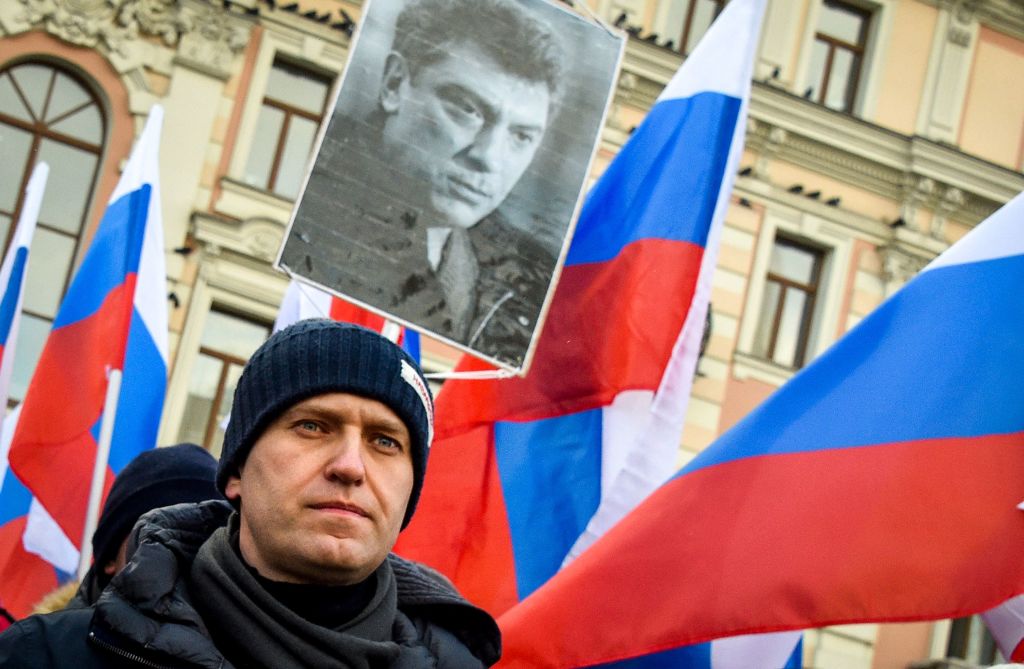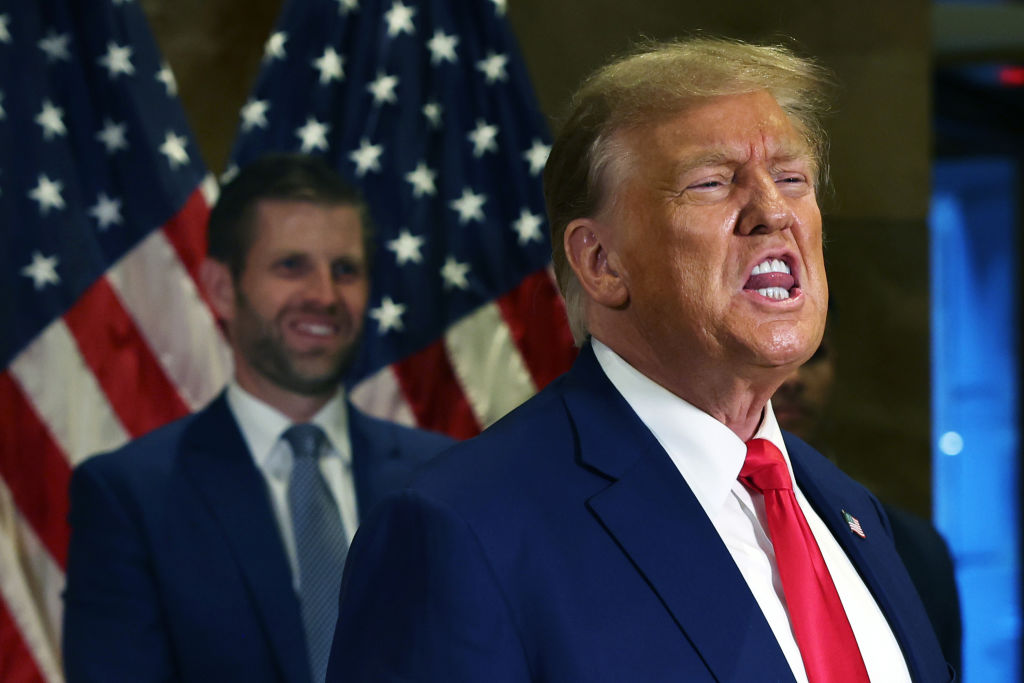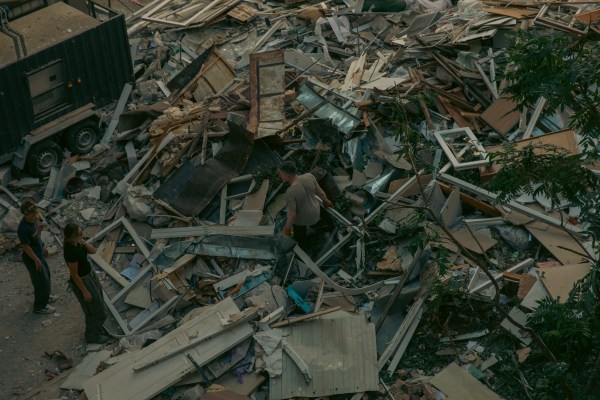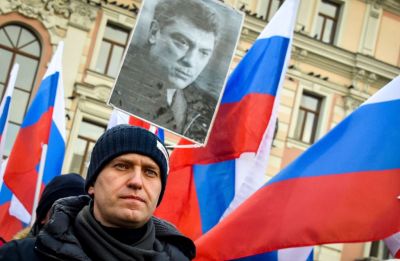Happy Tuesday! Nikki Haley’s campaign signaled yesterday she will deliver a speech this afternoon in Greenville, South Carolina, to “address the state of the presidential race.” While some have speculated that the former governor will be dropping out of the race, our bet is that she’s simply dropping her rebuttal to the Trump high-top sneakers.
Quick Hits: Today’s Top Stories
- The U.S. proposed a draft Gaza ceasefire resolution to the United Nations Security Council, multiple outlets reported on Monday. The document calls for a temporary ceasefire “as soon as practicable,” the return of all hostages taken by Hamas, and an increase in the flow of humanitarian aid to Gaza. The resolution also voices criticism of Israel’s planned ground offensive into the enclave’s southern city of Rafah, saying that “under current circumstances a major ground offensive into Rafah would result in further harm to civilians and their further displacement including potentially into neighboring countries.” The draft came after Algeria requested a vote over the weekend on an immediate ceasefire resolution that U.S. officials suggested they’d veto.
- Yemen’s Houthi rebels claimed responsibility for a missile strike targeting a Belize-flagged and British-owned cargo ship in the Gulf of Aden on Monday, seriously damaging the vessel and forcing the crew to abandon ship, according to the United Kingdom Maritime Trade Operations Center. The Iranian-backed militants claimed in a statement that the ship is now in danger of sinking. Also on Monday, the U.S.-designated terrorist group said that it had shot down a U.S. MQ-9 Reaper drone flying off the coast of Yemen, though U.S. officials have yet to publicly confirm the downing. Over the weekend, the U.S. military conducted five self-defense strikes against the Houthis, targeting anti-ship missiles and unmanned surface and underwater vessels.
- Wisconsin Gov. Tony Evers, a Democrat, signed into law new legislative maps for his state on Monday, giving Democrats the chance to take control of the Republican-dominated legislature. According to the Milwaukee Journal Sentinel, the new maps include 45 Democratic-leaning and 46 Republican-leaning state assembly districts and eight swing districts, while 14 of the new state Senate districts are Democratic-leaning, 15 are Republican-leaning, and four are competitive. Under the current maps, Republicans control 64 of the 99 assembly seats and 23 of the 33 Senate seats. “Wisconsin is not a red state or a blue state—we’re a purple state, and I believe our maps should reflect that basic fact,” Evers said yesterday. The new maps came after the Wisconsin Supreme Court—control of which was flipped last year by the election of liberal Justice Janet Protasiewicz—ruled in December that the old districts violated the state’s constitution for not being contiguous.
A Devastating Blow for Russia’s Opposition

When CNN’s Christiane Amanpour asked in late 2020 if he thought he’d be targeted upon returning to Russia, opposition leader Alexei Navalny responded with chilling honesty. “I don’t think that I can have such a privilege—being safe in Russia,” he said. “But I have to go back because I don’t want these groups of killers [to] exist in Russia. I don’t want Putin be ruling of Russia. I don’t want him being president. I don’t want him being czar of Russia because, well, he’s killing people.”
On Friday, Russian prison authorities announced that Navalny, age 47, had died in the Siberian penal colony where he was being held.
The announcement of Navalny’s death in a prison north of the Arctic Circle on Friday was both expected and shocking—a consistent target of Russian persecution, he had frequently outrun or outsmarted his tormenters in recent years. Though the Kremlin denies all involvement in his death, Navalny’s family and supporters—including U.S. President Joe Biden—accused Russian President Vladimir Putin of murdering the opposition leader who had posed perhaps the greatest threat to Putin’s iron grip on power.
In his roughly two decades of public life, Navalny was the main face of the Russian opposition—and was targeted as such. During the 2020 interview with Amanpour, he was recovering from an assassination-by-poison attempt made in August of that year, when Russian agents put a Soviet-era nerve agent, Novichok, in his underwear. A member of the team responsible admitted the plot to Navalny himself in a phone call.
As Jan Matti Dollbaum, the co-author of a book on Navalny, wrote in an obituary of Navalny for the site on Monday:
Purely by electoral standards, Navalny’s greatest political success came in 2013, when he finished second in Moscow’s mayoral elections, securing 27 percent of the vote. That vote signaled to the regime that it was time to end the strategy with which it had tried to present Navalny as the symbol of an unhindered yet always losing liberal opposition. Repression increased.
But the real highlight of Navalny’s political oeuvre was his 2018 presidential campaign. He was barred from the ballot, of course—the Central Election Commission cited a fraud case against him as rationale—but the effort helped him build a nationwide network of supporters for the first time in the history of opposition in post-Soviet Russia. He spearheaded an innovative system of tactical voting (termed “Smart Voting”), which led to successes for local opposition candidates between 2018 and 2020, in a few cases helping to rid United Russia of its majority. The Kremlin’s intense focus on Navalny—the assassination attempt in 2020, the imprisonment in 2021, the complete destruction of his organization—make clear that he and his team were the most potent opposition force Putin has ever faced.
The anti-corruption campaigner—he began his career by buying minority shares in companies run by oligarchs in order to ask embarrassing questions at board meetings and expose corrupt practices—had faced politically motivated charges of embezzlement, fraud, and money laundering; been placed under house arrest and served jail time; and had green disinfectant thrown in his face, causing damage to one of his eyes. But he was never cowed. In January 2021, after five months of recovery in Germany following the Novichok attack, he flew back to Russia on a plane half-full with journalists all begging him to admit he was afraid. Russian officials arrested him almost as soon as he stepped off the plane in Moscow.
Navalny never again knew freedom.
He was initially sentenced to two-and-a-half years in prison for violating the terms of his parole agreement from an earlier sentence. A year later, the courts tacked on a nine-year term for embezzlement and, in August of last year, added 19 years to his sentence for “extremism”—a particularly vague charge. “I understand perfectly that, as many political prisoners, I’m serving a life sentence, which is measured by the length of my life or the length of life of this regime,” Navalny said at the time.
Navalny’s years in the gulag were brutal. He went on hunger strikes and was moved in and out of solitary confinement for grave offenses such as failing to button his prison uniform correctly or not washing his face at the appropriate time. He accused the Russian government of slowly poisoning him, was denied medical treatment after getting the flu, and went missing briefly in December only to turn up in an even more remote penal colony in Siberia. “I understand that I am not the first, but I really want to become the last, or at least one of the last, of those who are forced to endure this,” Navalny wrote in an April letter to former Soviet dissident Natan Sharansky, who spent nine years in Soviet prison.
On the day before he died, Navalny joked with government officials on a video link from the penal colony. Looking healthy enough for being in his third year in a gulag and lobbing his typically acerbic jibes, he asked the judge to transfer some of his “huge federal judge’s salary” to Navalny’s own bank account. “Because I am running out of money,” he laughed, “and thanks to your decisions, it will run out even faster.” The judge and another official in the room chuckled, seemingly in spite of themselves.
On Friday, February 16, officials said Navalny had died, the victim—they claimed—of “sudden death syndrome,” collapsing after feeling faint on a walk. On Monday, when Navalny’s mother went to the morgue to claim her son’s body, authorities refused to hand it over, saying it would be undergoing a “chemical examination” for perhaps another two weeks, according to one of Navalny’s spokespeople. “The Russian prison system has said he collapsed after months of ill health,” Anne Applebaum, author of a history of Soviet labor camps, said in The Atlantic. “Perhaps he was murdered more directly, but the details don’t matter: The Russian state killed him. Putin killed him.”
That seemed to be the view of the hundreds of Russians who found ways to memorialize Navalny in recent days. Almost 400 people were arrested in some 36 cities in Russia over the weekend, many of them for the simple act of laying flowers at spontaneous memorials to Navalny. The tributes have cropped up at monuments honoring victims of Stalin-era political repression in Moscow and St. Petersburg; flowers and pictures, left by Russian civilians, are quickly bundled away into black bags—trashed as the mourners who left them were carted away by police.
Biden, along with many Western leaders, laid the blame for Navalny’s death at Putin’s feet. “Make no mistake, Putin is responsible for Navalny’s death,” he said on Friday. “What has happened to Navalny is yet more proof of Putin’s brutality.” Biden would not, however, go so far as to call Navalny’s death an assassination. “We don’t know exactly what happened, but there is no doubt that the death of Navalny was a consequence of something that Putin and his thugs did,” he said. In 2021, Biden promised “devastating” consequences if Navalny were to die, but it’s not clear what such consequences would be.
Sen. Lindsey Graham of South Carolina—who has historically been a Russia hawk but has lately flip-flopped on aid to Ukraine—suggested the U.S. designate Russia a state sponsor of terrorism in response to Navalny’s death. Such a move would be accompanied by a bevy of sanctions and export controls, and would put Russia in the company of Syria, North Korea, Cuba, and Iran. The European Union has also moved to place stricter sanctions on Moscow—on top of the sanctions regime already in place after Russia’s full-scale invasion of Ukraine.
Notably absent from the chorus of condemnation for Navalny’s death was former President Donald Trump. “The sudden death of Alexei Navalny has made me more and more aware of what is happening in our Country,” he wrote on Truth Social on Monday, echoing the language of the Russian officials regarding Navalny’s death. “It is a slow, steady progression, with CROOKED, Radical Left Politicians, Prosecutors, and Judges leading us down a path to destruction. Open Borders, Rigged Elections, and Grossly Unfair Courtroom Decisions are DESTROYING AMERICA. WE ARE A NATION IN DECLINE, A FAILING NATION! MAGA2024”. He did not condemn Putin or even the Russian penal system—but neither did he do so in 2020 after Navalny’s poisoning, unquestionably at the hands of the Russian government.
The future of Russia’s opposition movement—two years into Russia’s war in Ukraine and just weeks away from the March presidential elections—is uncertain. The Central Election Committee blocked anti-war candidate Boris Nadezhdin, whom Navalny had backed, from running against Putin, and the three other candidates are straw men supportive of Putin’s agenda. In a video released Monday, Navalny’s wife, Yulia, vowed to continue her late husband’s fight. “By killing Alexei, Putin killed half of me—half of my heart, and half of my soul,” she said, fighting tears at times during the address. “But I still have the other half, and it tells me I have no right to give up.”
She’s doing exactly what Navalny told his supporters they should do in the event of his death. “If they decide to kill me,” he said in the 2022 documentary about his poisoning, “it means we are incredibly strong. [...] The only thing necessary for the triumph of evil is for good people to do nothing. So don’t be inactive.”
Another Week, Another Courtroom Loss for Trump

Former President Donald Trump unveiled his latest business venture in Philadelphia on Saturday at Sneaker Con: Never Surrender High-Top Sneakers. The golden shoes, which went for $399 a pair, sold out hours after their announcement—welcome financial news for Trump, who will need to sell more than 1.1 million pairs to cover the costs resulting from his latest courtroom loss.
Justice Arthur Engoron delivered Trump a defeat on Friday, finding the former president liable for fraudulently inflating the value of his assets and concluding a yearslong civil fraud case that centered on Trump’s New York business empire. In his ruling, Engoron barred Trump—as well as his two sons, Don Jr. and Eric, who took over the family company after their father’s election—from serving in a leadership role in the Trump Organization, and ordered the payment of nearly $454 million in total penalties and interest. The ruling adds to a growing (and expensive) list of legal losses for Trump, who has turned his various legal battles into rallying cries as he runs for reelection.
Stemming from a lawsuit filed by New York Attorney General Letitia James in September 2022, the New York civil fraud suit focused on the business dealings of Trump and his company—alleging Trump and several business partners for years fraudulently represented assets in order to secure more favorable loan and insurance terms. As we wrote in October:
Evidence cited in the ruling showed that Trump regularly and consistently inflated his assets in statements of financial conditions (SFCs) to lenders and insurance companies—and not by paltry amounts. Trump claimed in SFCs that his Seven Springs estate in Westchester County was worth $261 million when four different appraisals valued it at $30 million or less. He also claimed his residence at Trump Tower was 30,000 square feet when it was actually only 10,996, and that it was valued as high as $327 million—which would have greatly surpassed the highest sale for a Manhattan apartment at the time, $88 million. … In total, Engoron found that Trump overvalued his assets between 2014 and 2021 by somewhere between $812 million and $2.2 billion.
After months of highly publicized and dramatic hearings, Engoron issued his ruling without a jury—a common practice in civil trials. The judge held Trump, his two adult sons, and two former executives not only liable for violating New York Executive Law, but judged that they were not sorry for their actions. “Their complete lack of contrition and remorse borders on pathological,” Engoron wrote in a 92-page ruling. “They are accused only of inflating asset values to make more money. The documents prove this over and over again. … Defendants did not commit murder or arson. They did not rob a bank at gunpoint. Donald Trump is not Bernard Madoff. Yet, defendants are incapable of admitting the error of their ways.”
As punishment, former President Trump has been barred from managing a business in New York for three years, and his two sons each received a two-year ban from serving as an officer or director of a New York-based company. James had originally pushed for Trump to be banned from New York’s real estate industry for life. Engoron also extended for three years an independent monitor to keep tabs on the Trump Organization and watch for additional fraudulent activity.
The total penalties include $355 million in disgorgement—when a party must surrender profits acquired from illegal or wrongful acts—in addition to roughly $98 million in prejudgement interest, which will continue to accrue interest until it is paid. Both of Trump’s sons were ordered to pay $4 million. Part of Engoron’s calculation determining Trump’s penalties included an estimate of how much money Trump saved in interest on loans by misrepresenting his assets, as well as money Trump recently made by selling two properties: a golf course in the Bronx, and a hotel located in the Old Post Office Building in Washington, D.C. Last year, Trump testified that he had over $400 million in cash on hand.
The financial punishment comes on the heels of another New York courtroom loss for Trump. Late last month, Trump was ordered to pay writer and columnist E. Jean Carroll more than $80 million as part of a defamation lawsuit. As a result of Friday’s ruling, the total cost of Trump’s civil litigation losses is approaching half a billion dollars.
Trump’s attorneys have promised to appeal the ruling, which could take years—in the meantime, Trump must pay the penalties or secure a bond within 30 days. The former president has made several statements lashing out against the ruling, calling the case politically motivated and echoing previous claims that his financial misrepresentations did not cause actual damage. “There were no victims, and not one person testified there was any fraud,” Trump posted on Truth Social on Friday, turning the legal battle into yet another campaign opportunity. “They are Crazed Lunatics who are destroying everything in their way. It all starts with Biden’s attacks on his Political Opponent!”
Worth Your Time
- While confined to a penal colony, Alexei Navalny corresponded with the Soviet dissident and writer Natan Sharansky, who spent years in Soviet prisons in the 1970s and 1980s. “I have just read your book, Fear No Evil, while I was held in the PKT,” Navalny wrote to Sharansky last April, according to correspondence obtained by the Free Press. “Now I am writing from SHIZO—it will be 128 days in total. I was laughing when I was reading the passage where you wrote, ‘I was penalized with a series of 15 days at SHIZO, and then, as an offender who broke prison rules, they sent me to the PKT for 6 months.’ I was amused by the fact that neither the essence of the system nor the pattern of its acts has changed. … I understand that I am not the first, but I really want to become the last, or at least one of the last, of those who are forced to endure this. Your book gives hope because the similarity between the two systems—the Soviet Union and Putin’s Russia—their ideological resemblance, the hypocrisy that serves as the very basis of their essence, and the continuity from the former to the latter—all this guarantees an equally inevitable collapse. Like the one we witnessed. The most important thing is to arrive at the correct conclusions, so that this state of lies and hypocrisy does not enter a new cycle. In the preface of the 1991 edition you write that dissidents in prisons have kept the ‘virus of freedom’ and it is important to prevent the KGB from inventing a vaccine against it. Alas, they have invented it. But in the current situation, it is not them who are to blame, but us, who naively thought that there was no going back to the old ways. And for the sake of good, it’s okay to rig elections a little bit here, or influence the courts a little bit there, and stifle the press a bit over here. These little things, and the belief that it is possible to modernize authoritarianism, are the ingredients of this vaccine.”
Presented Without Comment
CBS News: Regretful Wisconsin Fake Elector Says He Was Tricked Into Signing Phony Document Claiming Trump Won in 2020
Also Presented Without Comment
KDVR: Colorado High Schoolers Get Cornhole College Scholarships
Toeing the Company Line
- There will not be a new episode of Dispatch Live tonight; instead, keep an eye out for information on how to tune in for a special edition later this week.
- In the newsletters: Kevin argued (🔒) that Biden’s age and decline are legitimate stories for the media to cover.
- On the podcasts: On the latest episode of Advisory Opinions, Sarah and David break down the Alabama Supreme Court case designating embryos as minors.
- On the site: Chris remembers two presidents—Lyndon B. Johnson and Richard Nixon—who stepped away for the good of the country, and Emma Rogers explains the details of NATO funding.
Let Us Know
What “devastating consequences”—as described by President Joe Biden—do you think Moscow should face for the death of Alexei Navalny in prison?








Please note that we at The Dispatch hold ourselves, our work, and our commenters to a higher standard than other places on the internet. We welcome comments that foster genuine debate or discussion—including comments critical of us or our work—but responses that include ad hominem attacks on fellow Dispatch members or are intended to stoke fear and anger may be moderated.
With your membership, you only have the ability to comment on The Morning Dispatch articles. Consider upgrading to join the conversation everywhere.